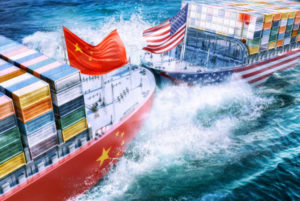Is economic warfare imminent between China and the United States? In Foreign Policy, Zongyuan Zoe Liu outlines China’s preparation for economic warfare with the United States, writing:
Chinese policymakers are increasingly convinced that the United States is determined to implement a full-fledged strategy of containment against China. Beijing views the Indo-Pacific Economic Framework for Prosperity as the economic mirror of the Quadrilateral Security Dialogue and AUKUS, two U.S.-led security pacts that Beijing regards as anti-China coalitions. Chinese officials, academics, and media rhetoric increasingly talk of self-reliance and are preparing for a forced decoupling from the United States. Fang Xinghai, a vice chairman of the China Securities Regulatory Commission, proposed accelerating the yuan’s internationalization to prepare for the risk of forced financial decoupling. A Shanghai-based academic argued that “the peace dividend is over”—hence, “it is time that China prepare for a full decoupling.” Even the more moderate voices have acknowledged the profound changes in U.S.-China relations behind the “decoupling theory” and called for China to “prepare for the worst but strive for the best.”
While part of the likely response will be the further strengthening of China’s military, the party-state will also tighten two economic strings in its bow. It will double down on pursuing a preexisting self-reliance strategy and sanction-proof the Chinese economy while bolstering its offensive geoeconomic capabilities by reinforcing China’s strategic position in global supply chains and expanding its influence in international commercial sea lanes.
The Chinese Communist Party (CCP) made “independence and self-reliance” the centerpiece of its 2021 historic resolution. The West’s recent harsh sanctions on Russia have reminded Chinese leaders of the need to strengthen economic autonomy. On Feb. 25, the day after Russia’s invasion of Ukraine, a People’s Daily editorial argued that “independence and self-reliance ensure that the cause of the party and the people will continue to move from victory to victory.” The government recently vowed to improve self-reliance by building a “national unified market.” Policymakers are looking to prepare the Chinese economy to withstand the heavy economic blow caused by a forced decoupling.
These concerns are not new. Chinese policymakers have been advocating reforming the global financial system since immediately after the Asian financial crisis at the end of the 1990s, seeking to hedge against U.S. dollar hegemony. In 1999, Dai Xianglong, then-governor of the People’s Bank of China (PBOC), argued that the existing global financial system “needs to be reformed” because “the role of international reserve currency played by a few countries’ national currency has been a major source of instability.”
One major component of China’s defensive strategy against perceived Western containment is building a yuan-based global commodities trading system, in an effort to improve the yuan’s pricing power, reduce China’s vulnerability in the global resources trade, and strengthen China’s global financial position. Major Chinese oil suppliers, such as Russia, Angola, Venezuela, Iran, and Nigeria, now accept yuan in their oil trade with China. The Shanghai International Energy Exchange launched the yuan-based Shanghai crude oil futures in 2018, and in April 2021, the total trade volume of the yuan-valued oil futures reached 44 trillion yuan ($6.7 trillion), with clients from 23 countries and regions. Oil exporters could convert their yuan oil revenue into gold on the Shanghai and Hong Kong gold exchanges. This interconvertibility implies that China, the world’s largest oil importer, has a complete domestic infrastructure for indirectly trading oil using gold. This marks the beginning of pricing alternatives for a major global commodity.
If you’re willing to fight for Main Street America, click here to sign up for the Richardcyoung.com free weekly email.






